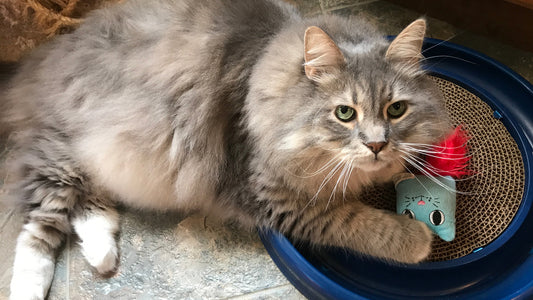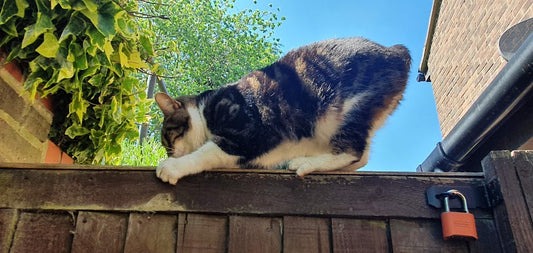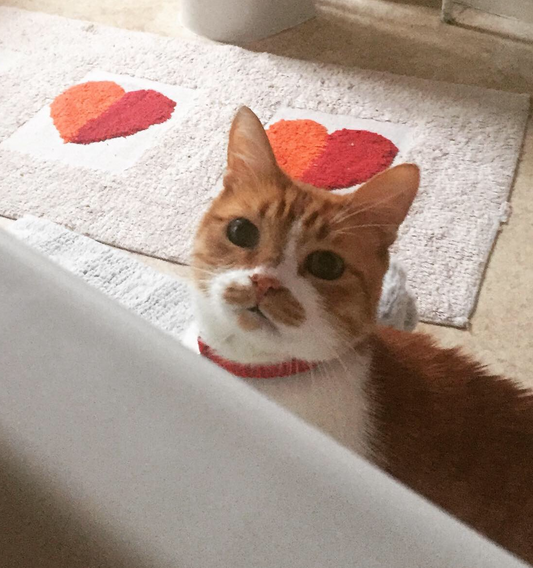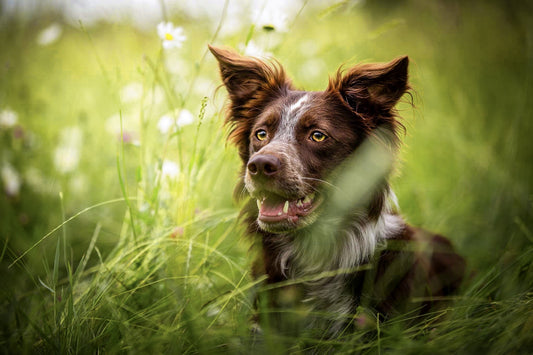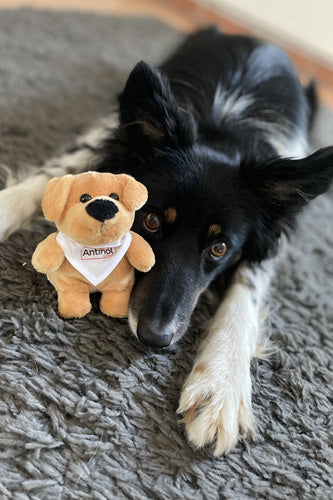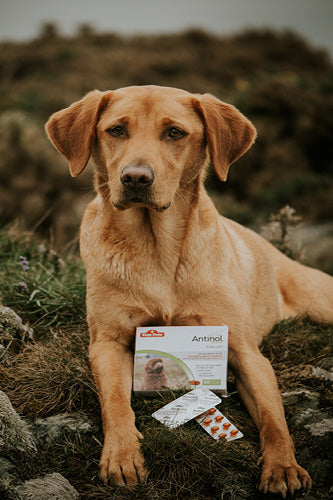You're ready. It's time to take that first step into pet ownership. Becoming a fluff-ball parent is super exciting, and you're ready to add a feline friend or canine companion to your family.
Here are some top tips and things to consider before getting a pet.
Benefits to owning pets
An estimated 53% of UK Adults have a pet. There are roughly 10.2 million pet dogs and 11.1 million pet cats across the UK.
We all know that dogs and cats are good for our mental well-being, adding love and companionship to our lives, but did you know that being a pet parent benefits your physical health as well?
Having a dog gets us up and out of the house much more regularly, as they need to go for a walk. But it's not just the extra exercise that's good for us. Just having pets in our lives can boost our health.
Pet owners over the age of 65 make 30% fewer visits to their doctors than those without pets.
Heart attack survivors living alone who owned dogs had a 33% lower risk of death compared to survivors who did not own a dog.
Things to consider before getting a pet

Do I have time for a pet?
Cats require less time and attention than dogs, although they can still be pretty needy, and any pet will need some of your time and attention. But if you are out at work every day or not home lots, cats are much more independent than dogs, so your lifestyle may be better suited to a cat.
Do I have space for a dog or cat?
Think about your home. Do you have indoor space and access to outside space too? The space you have can influence your pet choices. Some dog breeds, such as chihuahuas or whippets, are better suited to smaller homes or no those with no garden, as long as you can get them out on plenty of walks. Cats are less fussy on space, as long as you can give them plenty of mental stimulation. Many cats live happy lives as indoor pets; although in the UK, 70% have access to indoor and outdoor space.
Do you have enough outdoor space for a dog or cat?
Although outdoor space isn't essential for a cat, giving them access to some fresh air is ideal, and life with a choice of indoor or outdoor is perfect, assuming they can stay safe.
Dogs need access to outside space, as they thrive on mental stimulation (and aren't as easy to litter train!) Space to stretch their legs and run around is incredibly important to them. But if you don't have a garden, consider where else you could take them regularly to go to the toilet, or to exercise. Maybe a local park, head out to the countryside, or exercise their brains by trying a dog sport?
How much does it cost to own a cat or dog?
Purchase or adoption costs aside, it is estimated that it costs around £750 per year to own a medium-sized dog. Slightly more for dogs. These costs are based on meeting their basic welfare needs and covers...
- Food
- Treats
- Routine vet treatment
- Insurance
- Toys
But you must consider other lifetime costs that may occur during their lifetime, including those that are lifestyle or breed-specific.
- Grooming
- Supplements
- Surgical and medical veterinary bills
- Training classes
- Boarding
That might seem a daunting list, but it's worth every penny for all those furry snuggles, fun and adventures.

Where should I get my dog or cat?
This is one of the most important things to consider once you have decided that a pet will fit into your life. Pet parents get their pets from different places for different reasons, with pros and cons to each.
Puppy vs adult
Do you have the time and patience to dedicate to a puppy or kitten? They'll likely have had no training and won't be toilet-trained. Although they are adorable in their teeny fluffy form, they are bundles of enthusiasm and energy, just waiting to explode all over your home.
If you have young children, taking on a puppy or kitten is often the route pet parents take. They grow up with your kids and aren't set in their ways, so may be more tolerant of the loud, chaotic environments that homes with small children can be.
What age are your kids? Can they handle the chewing, mouthing phase as your new puppy or kitten learns about the world? The likelihood of accidental nibbles is high.
Taking on a young pet is incredibly rewarding, watching them grow and settle into family life. But adopting an older pet can be equally as rewarding, and it's worth considering if a more mature furry family member might suit you better.
Often (not always), they have some basic training and are more able to focus on training than a puppy or kitten—they might already be toilet-trained and know basic commands like "sit" and "stay". Their personalities are developed, so you'll know they're going to fit into your family, and you'll have a heads-up of any potential health problems.
Rescue vs Breeder
When getting your first pet, many new owners worry about adopting from a rescue centre. What if the dog or cat is difficult, has behavioural or health problems, or comes with emotional baggage?
All of these are things to consider, and some rescue pets have had rough starts in life, and you may need to work to gain their trust. But giving a rescue dog or cat a chance and a loving home can be all the more rewarding.
In 2022 it was reported that around 3.4 million households gave up a pet in the previous year. Thats a lot of pets needing some love!
Buying a dog or cat from a breeder might be a good option for your family if you are unsure about adopting a rescue pet. You should be able to meet the parents, have a better understanding of their potential health problems, and have a point of contact in the breeder, should you have any worries.
Pets are much more expensive to buy from breeders than the adoption fees from rescue centres, and you can still never guarantee that their personality will suit your family.
Either way, rescue or breeder, you are offering a warm, loving home to an animal who will always love and appreciate that you opened your heart to them.
The Kennel Club has a huge range of resources to help you choose a dog breeder. If it's a cat you're looking for, check out The Governing Council of The Cat Fancy.
There are millions of pets waiting for new homes in animal rescue centres across the UK. Visit Battersea, or one of the hundreds of local rescues, to find a pet in need.

Breed research
From a teeny Chihuahua to the giant Great Dane, or a chatty Siamese to a fluffy Maine Coon, the range of dog and cat breeds is huge...and then there are all the mixed breeds!
Do your research when picking a breed. They are all unique, and not all breeds will suit your family. For example, if you love to walk for miles, you might want to consider a Spaniel rather than a Greyhound—but if you prefer a quiet life, then a Greyhound could be perfect!
Check out the potential health risks for the breeds you are interested in. Are they prone to hip dysplasia, eye conditions, or behavioural problems? Do your research thoroughly and make sure you're up to taking on any potential issues.
Once you have narrowed it down to a few breeds, contact local rescues, find breed-specific rescues, or contact a reputable breeder and get searching for your perfect new pet!
Don’t forget; rescues will be full of wonderful mixed-breed pets, so get in touch with them and explain your family situation and what you are looking for—they may have just the right pet for you.
What equipment do I need for my new dog or cat?
Oooh! Shopping for your new arrival is so much fun! There is so much choice and so many incredible products. You could spend a fortune on beautiful, shiny accessories, but it doesn't have to break the bank! Here are the basics you'll need for your new arrival.
Cats |
Dogs |
| Bed | Bed/Crate |
| Food | Food |
| Cat bowls for food and water (ideally 1 more than the number of cats in the house) | Dog bowls for food and water |
| Litter trays (ideally 1 more than the number of cats in the house) | Lead, collar and harness |
| Collar and tag | Toys |
| Carrier for vet visits | Grooming brush |
| Toys |
Keeping your new pet healthy
A healthy pet is a happy pet, and there are lots of things you can do to help your new pet stay fit and healthy.
Register with a vet
This should be one of the first things you do, then book a visit to get their vaccinations and parasite treatments up to date. Regular veterinary care is vital to the overall health and well-being of your pet. They can help you identify problems early and support you through any illness or injuries.
Choose a good food
The pet food industry is enormous, and there are so many choices. Read up on the feeding options and chat with your vet or a nutritionist who can help you pick the best option for your family.
A healthy diet will support your pet's long-term health and can even be tailored to their individual medical conditions—but don't overfeed your pet. Overweight dogs and cats are much more likely to struggle with health problems than if you keep your pet slim and fit.
Insurance
If you're adding a furry friend to your family, pet insurance is something you should consider to cover emergency veterinary fees. The average pet insurance claim in 2021 was £848. If you don't have that cash easily accessible, pet insurance reassures you that your pet can still have the life-saving medical care they need.
Keep them busy
Busy minds and active bodies tend to mean your dog or cat is more relaxed and settled at home rather than battling boredom that results in bad behaviour.
Try a Canine sport with your dog, such as Dock Diving, Agility or Flyball. It gets you both out and keeps your dog's brain and body busy.
Cats need exercise and mental stimulation too. A cat tree and some toys to chase will keep them busy. If it is safe, access to the outside world will provide them with a ton of exercise and stimulation—great for keeping them healthy.
Healthy through the ages
As your pet ages, their medical needs will change, but there are some steps you can take to support their long-term health and keep them fitter, for longer.
Manage their weight
Don't let them get overweight, as they are more likely to develop conditions such as diabetes, heart disease and cancer.
Regular health checks with a vet
Keeping their vaccinations up to date and managing parasites throughout their lives helps keep your pet healthy.
Support their joints with a supplement
Adding a joint supplement to their daily routine can support their joint health and help them maintain normal, healthy mobility throughout their lives.
Get to know them
Once you know what is normal for your pet, you'll easily be able to pick up on changes that could be a worry. Learn their routines, what their poop normally looks like and how they behave. You'll soon notice if something is not right.
So, you're ready to welcome your new cat or dog into your family. Life is about to change for the better, forever. Enjoy cuddles with your new furry friend and see what new adventures life as a pet parent has to hold!
We would love to see your new addition! Send us a cute phone by email or on our social media channels. Instagram Facebook.



